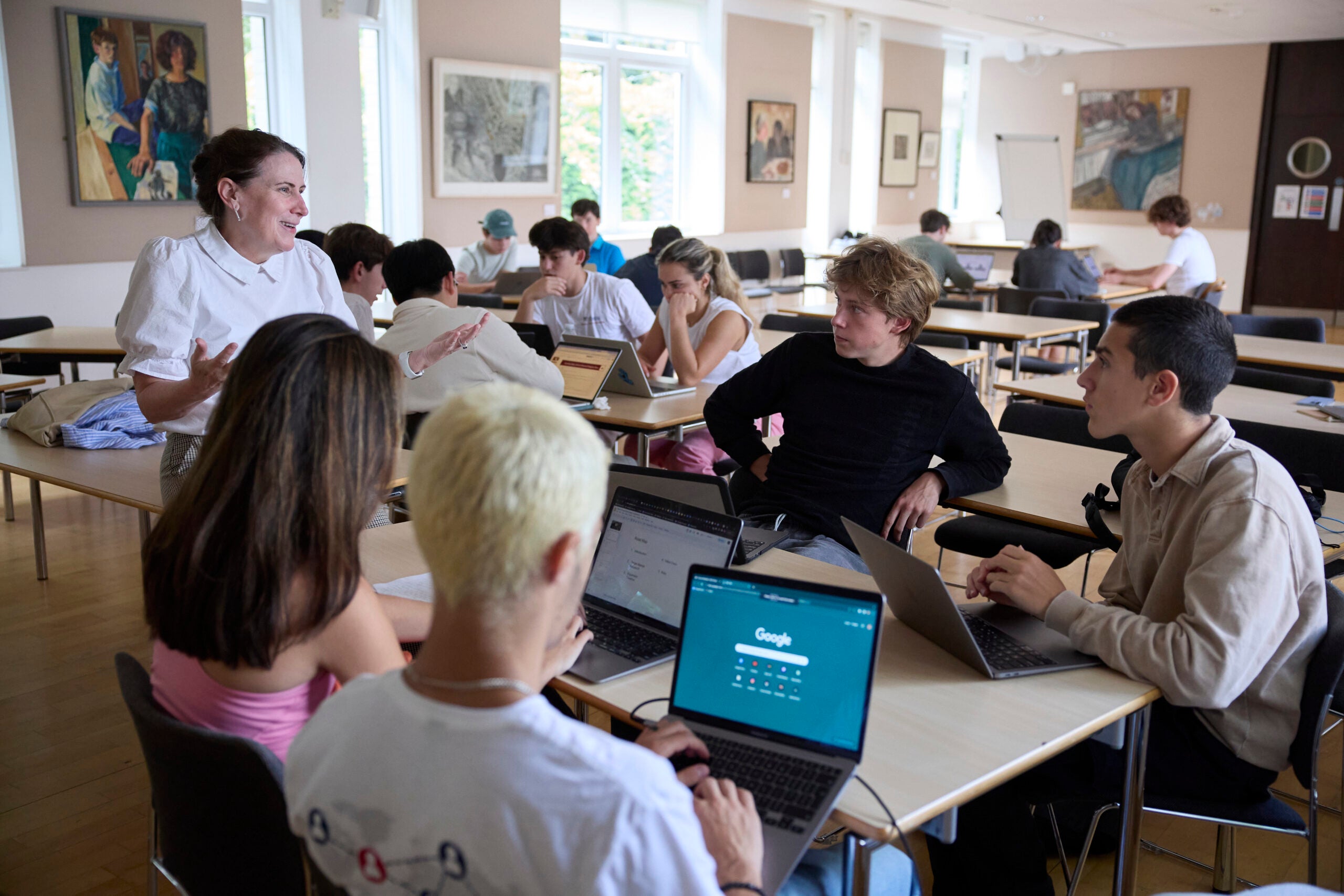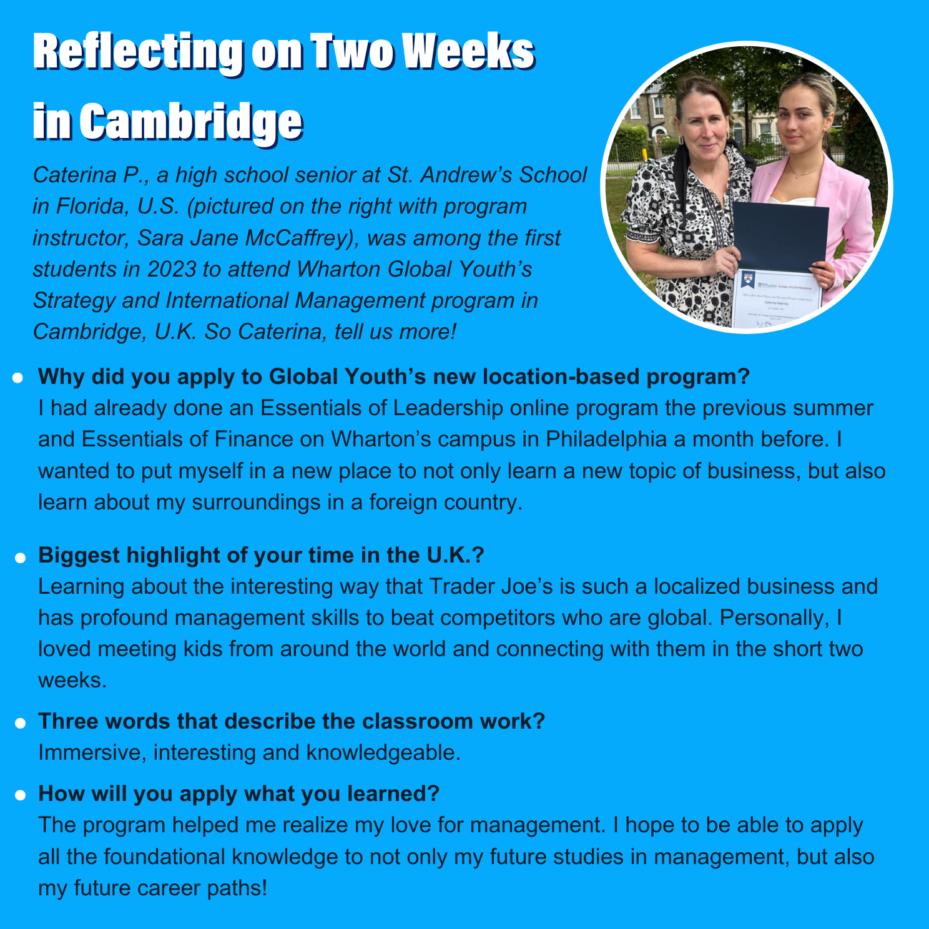On Location with Sara Jane McCaffrey: Global Youth Students Explore Competitive Advantage in Cambridge, U.K.


Sara Jane McCaffrey (pictured above with a group of students), a senior fellow and lecturer at the Wharton School of the University of Pennsylvania, spent the better part of her 2023 summer in Cambridge, United Kingdom, teaching Wharton Global Youth’s newest location-based program, Strategy and International Management.
During back-to-back two-week sessions at Murray Edwards College of the University of Cambridge, 90 high school students explored core management and international business concepts. In addition, the course invited students to apply strategy and international management structures to contemporary business problems.
Wharton Global Youth sat down with Sara Jane for a program debrief on industry analysis, case-study collaboration, and local culture and business exploration.
Wharton Global Youth: How was your first Global Youth summer in Cambridge, U.K.?
Sara Jane McCaffrey: It was a wonderful experience. We had a great group of enthusiastic students. People had an exploring mindset in England; exploring both aspects of the curriculum, as well as the location and social experience.
We had students from the U.K., the European Union, Brazil, China, Korea, and many from the U.S. Some students told me that this was the first time they used their passport, and for many, it was the first time they had an academic experience in a totally different location.
Wharton Global Youth: The program’s purpose is to acquaint students with core concepts of management and international business. What specific topics did you teach?
Sara Jane: We started with examining a firm’s competitive advantage in the home market, learning about the firm’s resources, and how to conduct an industry analysis. Then, through value-chain analysis, we discussed expanding horizontally or vertically. In particular, we looked at geographic expansion. What kinds of variables and frameworks are helpful for a firm to analyze whether and where it makes sense to expand internationally?
Wharton Global Youth: Did high school students in the program have experience with competitive advantage and international expansion?
Sara Jane: Some were vaguely familiar with Porter’s Five Forces and most of them had some background in economics, including supply and demand and competition. But this kind of industry-level and firm-level analysis was completely new for a lot of them.
Wharton Global Youth: The course also invites students to apply strategy and international-management frameworks, like you just mentioned, to relevant contemporary business problems. Can you give us some case-study examples?
Sara Jane: We presented theory and frameworks in class, and then we looked at a particular firm as a case study — not necessarily because it was illustrative of doing all the right things, but rather, to give students a mechanism to learn what the options are and how decisions are made. I made a strenuous effort to include companies outside the U.S. throughout the program. We looked at Luxottica, for example: how it has expanded within the value chain for eyeglasses, but also across borders internationally. We looked at how Lego, which is headquartered in Denmark, expanded internationally, and has moved from plastic bricks to many industries, including educational software. The big questions are: how do these companies decide which businesses are good extensions of their core competitive advantages, and how do they make that work?
Wharton Global Youth: Why are cases so fundamental to this type of instruction?
A big purpose of case studies is that they help students put themselves in the decision-maker’s shoes. In a specific set of circumstances, how do people with limited information and bounded options make what they hope will be the best decision? Cases can really make a problem concrete for students.
The case-study method also helps students prepare for class. You need to do the reading before you come to class to get the most out of it. When I started my freshman year at college, the first week, somebody said, ‘Oh, do you have any homework?’ And I said, ‘No, just reading.’ I didn’t quite understand that the reading was the homework and required a serious amount of effort to do well. Case-based teaching requires that students read thoroughly, and come ready with questions, comments, and probing insights. The preparation is key to the learning. In college, we ask students to be much more self-directed and inspired learners. Through the Wharton Global Youth summer programs, I hope to illustrate how that works, but also to explain to students why. I make it explicit: if you don’t think about the preparation questions ahead of time, then you’re unlikely to get the insights from the frameworks.
“When students look at business problems, they don’t always see the impact of government institutions or regulations. But if you peel back the layers, particularly when you’re looking at multinational locational decisions, students can see how these factors impact business decisions.” –Sara Jane McCaffrey, Program Instructor
Wharton Global Youth: You toured British automaker Mini Cooper, which has a manufacturing hub in Oxford, England. What strategy and international business insights came out of this experience?
Sara Jane: We first assigned the students to read a case on BMW and Brexit, because BMW owns Mini Cooper. BMW is involved in a very complex global supply chain, and Brexit has had a huge impact on the U.K. auto sector. For Mini Cooper, 90% of parts came from continental Europe. As a result of Brexit, these parts were going to be delayed at the border. It created huge challenges for managing a complex supply chain with expensive inventories.
The strategy for the U.K. location of Mini Cooper production was based on being part of the E.U., where BMW can send parts from its factories in Germany. What happens when that’s no longer smooth, easy and cost-free? The unintended consequences of political decisions are incredibly important for the managers here. And the regulatory environment is one of the main factors in how to make these kinds of decisions.
Wharton Global Youth: Did the students get a lot out of the visit to Mini Cooper’s Oxford plant?
Sara Jane: The tour guides were retired Mini Cooper employees. The gentleman who gave one tour had been a high-level manager at the Oxford plant and had also worked for Honda in China and in Canada. He had a global view of the auto industry and where it’s going. And at the same time, he talked about the strong roots in the Oxford area. Mini Cooper is such a British-identified brand. So, we talked about what it might mean to have a Mini Cooper made in China. How would that impact the brand going forward? And we talked about the fact that the U.K. government certainly doesn’t want to see Mini Cooper go elsewhere.
We went to the Mini Cooper plant two times during our back-to-back summer programs. I thought the first visit went well, but the second time I wanted to help my students make more connections between our classroom discussions and what we saw on the factory floor, so I created a Mini Cooper bingo game for them. I gave each student a bingo card with concepts we had discussed in class, like Brexit and Fordism, so students could see the applications of the theory we’d discussed. The students who filled in their bingo cards and were able to explain to me where that fit into the program’s curriculum got an Oxford University t-shirt. The Mini Cooper factory is 10 minutes from Oxford University, so after we did the company tour, we went to Oxford for a visit.
Wharton Global Youth: Did you explore differences of the business culture in the U.K. compared to other countries?
Sara Jane: We visited a U.S.-headquartered financial firm in London, where the students asked a lot of questions about the cultural differences of working in finance in London versus in New York City, for example. We hope to do even more of this in future location-based programs.
Wharton Global Youth: High school students love competitions! Describe the final-day case competition. How did it play out?
Sara Jane: Wharton undergrad students in the Muse Club, which sponsors a team for intercollegiate case competitions, helped me design our first case competition for the Cambridge program.
In this type of competition, teams are supposed to analyze a specific business problem, get information on the business environment, the industry, the expenses, the costs, and so on, and come up with potential solutions to the problem. For example, the Wall Street Journal wants to come up with strategies to increase readership of people between the ages of 16 and 30. Where would you put your marketing budget? Come up with specific strategic advice for the Wall Street Journal to achieve this goal. It’s a very concrete way to look at a problem and focus your attention on coming up with specific advice, which forces you to make decisions. Usually in inter-collegiate case competitions, everybody analyzes the same company. For the Global Youth contest, we allowed students to analyze different companies from a variety of countries.
In our case challenge, students formed teams as international strategy consultants. They were told that the CEO and the board of a company decided to internationalize part of their business. Students had to come up with strategic advice for this firm on where, when and how they should internationalize, looking at their supply chain, or their operations, or their international market presence. Using the tools and the frameworks they learned in class, they needed to ask: What is the competitive advantage of this firm? What is the industry competition in their home environment and in the projected new market? What kinds of variables — cultural, administrative, geographic and economic — should they pay the most attention to in deciding international strategy for this case?
Teams of four or five students had to then come up with a specific plan for their company and present their proposals to a panel of judges, who were affiliated with the Cambridge Judge Business School.
Competition day was exciting, and I think it went well. One of the winning teams did their project on an international Chinese hotpot company. They did an amazing amount of work. Because of the time difference, in the middle of the night they called up restaurants located in cities like Las Vegas to ask them about their customer profiles and management practices. I think all the students enjoyed the competition and got a lot out of it. And again, it’s taking exactly what we did in class and applying it to a specific case, so it’s rooted in the curriculum.
Wharton Global Youth: Strategy and International Management is unique among Global Youth’s summer offerings, both in location and content. Now that you’ve been through the first rotation, what did you learn that you can apply to next year’s program? What did you learn from the students?
Sara Jane: Cambridge, U.K. is a great location. It is an engineering hub and has been called Silicon Fen, or the Cambridge Cluster, because of its large number of high-tech businesses. This will continue to add real value to the program.
In general, I think the students were happy with how Strategy and International Management went. When students look at business problems, they don’t always see the impact of government institutions or regulations. But if you peel back the layers, particularly when you’re looking at multinational locational decisions, students can see how these factors impact business decisions and begin to understand competition and strategy as rooted in a specific location and institutional configuration.
For me, it’s always exciting to see business problems through fresh eyes. I learned a lot from the students too!
 Hero image photo credit: Ian Tuttle
Hero image photo credit: Ian Tuttle